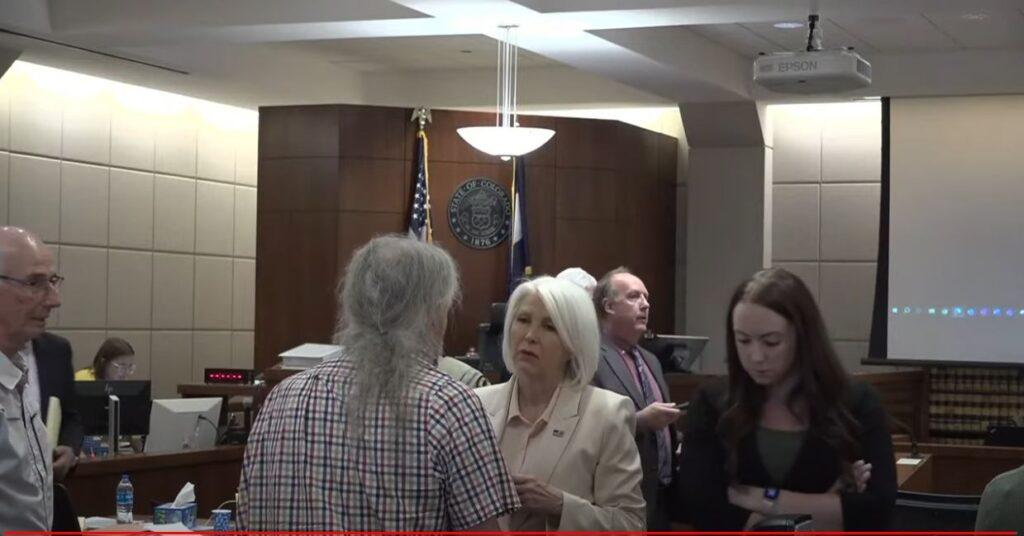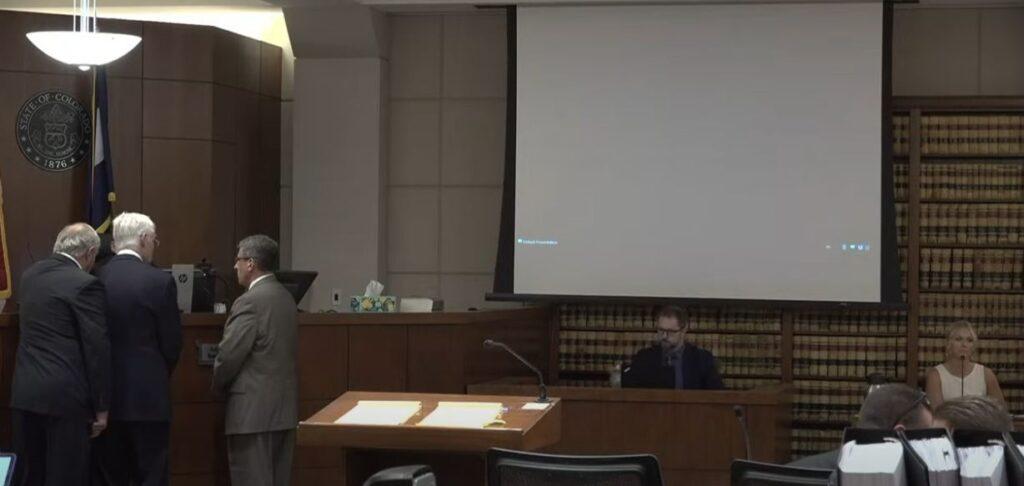
Updated 6:38 p.m. on Tuesday, March 4th, 2025.
The U.S. Department of Justice said Monday it plans to review the state conviction of former Mesa County Clerk Tina Peters on charges related to helping a man gain unauthorized access to voting equipment in 2021.
The DOJ does not have the power to overturn a state conviction, and it’s unclear what, if any, intervention in the case the department or a federal court could make.
Peters was found guilty of four felonies in August after a criminal trial and sentenced to nine years in prison. Prosecutors said Peters gave the man access to voting equipment during a software update in May 2021. The county’s voting machine’s passwords and copies of its hard drive were later posted online by people trying to undermine the validity of the election system.
In a court filing Monday, Yaakov Roth, an acting assistant attorney general, said the Justice Department plans to evaluate the state prosecution of Peters and, citing an executive order signed by President Donald Trump, said it would look at “whether the case was ‘oriented more toward inflicting political pain than toward pursuing actual justice or legitimate governmental objectives.’”
“Parallel to these proceedings and Ms. Peters’ direct appeal, the Department of Justice is reviewing cases across the nation for abuses of the criminal justice process,” Roth wrote, citing an executive order from President Donald Trump entitled “Ending the Weaponization of The Federal Government.”
The news of the review was first reported by the New York Times. Peters is also appealing the conviction in federal District Court.
Monday’s court filing also expresses concern about the length of sentence Peters received and whether the state’s denial of bail pending an outcome of Peters’ appeal is “arbitrary or unreasonable.” It also asks for “prompt and careful consideration” by the federal District Court and state appellate courts.
Peters has become a celebrity in the world of those who embrace Trump's lies that he lost the 2020 election due to fraud. Her supporters have been pushing the new Republican administration to pressure Colorado's Democratic governor, Jared Polis, to pardon her.

In October’s sentencing hearing, 21st Judicial District Judge Matthew Barrett admonished Peters.
“You are no hero,” Barrett told Peters. “You're a charlatan who used, and is still using, your prior position in office to peddle a snake oil that's been proven to be junk time and time again.”
Prosecutors said Peters continued to argue, even after her conviction, that she did nothing wrong. Peters and her lawyers claimed the jury wasn’t allowed to hear other evidence she wanted to present, including evidence tied to conspiracies about the county’s Dominion voting machines that were often touted by Trump and his allies, including Peters.
The intervention by Trump's Justice Department in the Peters case marks a new stage in the administration's effort to use the federal government to promote the president's political interests. By getting involved in a state-level prosecution, in a case filed by an elected Republican prosecutor in Colorado, the Justice Department is taking an even more unusual step than it has in previously supporting the president's agenda.
Previously, Trump pardoned more than a thousand people convicted in the Jan. 6, 2021, attack on the U.S. Capitol. He named an attorney for some of those defendants, Ed Martin, to be acting U.S. attorney in the District of Columbia. Martin has since threatened to investigate Democratic politicians and others who criticize the Trump administration's cost-cutting efforts. The Department of Justice also moved to drop corruption charges against New York's Democratic mayor, Eric Adams, contending that they, too, were tainted by “weaponization” and that the administration needed Adams' cooperation in its immigration enforcement efforts.
Mesa County District Attorney Daniel P. Rubinstein, a Republican who has served in that role since 2015, prosecuted Peters’ case and said nothing about it was politically motivated.

“In one of the most conservative jurisdictions in Colorado, the same voters who elected Ms. Peters, also elected the Republican District Attorney who handled the prosecution, and the all-Republican Board of County Commissioners who unanimously requested the prosecution of Ms. Peters on behalf of the citizens she victimized," Rubinstein said in a statement to The Associated Press. "Ms. Peters was indicted by a grand jury of her peers, and convicted at trial by the jury of her peers that she selected.”
Peters' attorney, John Case, was heartened by the news. “Tina was targeted because she executed her duty under federal law to preserve election data that the Secretary of State deleted from every other Colorado county,” Case said. “We welcome the federal investigation.”
The breach of election systems in Mesa County allowed sensitive information about the county’s voting system, which is used in counties across the country, to be posted online. Experts have described the breach as serious, saying it could provide a “practice environment” that would allow anyone to probe for vulnerabilities that could be exploited during a future election.

Peters, 69, has argued that she had a duty to preserve election data before the voting system was upgraded and that she should not be prosecuted for carrying out her job. Earlier this year, she filed a last-ditch appeal in federal court asking a judge to order her released on bail while her appeal is pending. Her attorneys noted she is being monitored for a recurrence of lung cancer and say she has lost weight and has experienced memory problems while she's incarcerated.
On Tuesday, Peters was still being held in Larimer County jail, 60 miles (about 95 kilometers) north of Denver. She is serving a six-month sentence for a misdemeanor before she will be transferred to a state prison to serve a sentence of more than eight years in the voting machine case, according to the federal court filing.
In the federal government's filing in the case, made Monday, Roth said Peters had received an “exceptionally lengthy sentence imposed relative to the conduct at issue” and urged the federal judge to consider Peters’ request to be released pending her court appeals.
Colorado Secretary of State Jena Griswold, a Democrat who is the state’s top election official, criticized the Justice Department's actions related to the Peters' case as a way to "normalize fake election conspiracies.
“Shame on them for weaponizing the legal system to push their election lies,” she said.

Among those advocating on Peters’ behalf is MyPillow CEO Mike Lindell, a Trump ally who has called for voting machines to be banned and who visited the White House recently. Lindell has long supported Peters, and in recent weeks has been sending emails calling for her release, saying she is a victim of the “election fraud Uniparty.”
Lawrence Norden, an election security expert at the Brennan Center for Justice, said the case against Peters was “an open and shut case of official misconduct.”
“The statements from the Department of Justice, coming after the administration has dismantled a number of federal guardrails to protect the integrity of our elections, sends a terrible message to election officials and the broader community about where the administration stands on election security,” Norden said.
Trump's administration has taken several steps to weaken election security since the president returned to power. In recent weeks, the Department of Homeland Security has paused all election-related work and placed on leave at least 17 staffers who have worked on election security at the U.S. Cybersecurity and Infrastructure Security Agency pending a review. It was also ending its involvement in a voluntary program that shared information with and provided cybersecurity resources to state and local election officials.
The AP's Nicholas Riccardo and Christina Cassidy reported and wrote the wire copy for this story. CPR’s Bente Birkeland contributed to this report.









